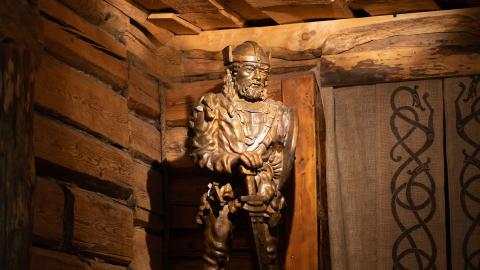
What was it like to be a woman in Ancient Sparta?
Image: A Spartan Woman Giving a Shield to Her Son (1805) | Public Domain
Sex: A Bonkers History explores how sexual behaviour through the ages has shaped civilisation in ways we are only now beginning to discover. In episode one, host Amanda Holden trains as a Spartan woman to learn how they were just as kick-ass as the men.
In the misogynistic world of Ancient Greece, men ruled the city-states whilst the women were confined to their homes with no societal or political freedoms to enjoy. However, there was one city-state during this time that differed from the others in its treatment of women, Sparta.
There, women enjoyed significantly more freedom than elsewhere and were renowned for their independent minds. Not only could they own and manage property, but they were considered equals with men; an entirely alien concept to the rest of Ancient Greece.
Background
Sparta was a military society with roots dating back to the 900s BC. Famous for its warriors and militaristic values, Sparta secured its place in history at the Battle of Thermopylae in 480 BC. Under King Leonidas, 300 of its finest soldiers kept a Persian army, said to be in the hundreds of thousands strong, at bay for several days until they were finally overrun.
The 5th century BC represented the height of Spartan dominance in Ancient Greece and was also the pinnacle of its rivalry with Athens. The differences between the two city-states were stark both culturally and politically. While Sparta was a military state ruled by a select few, Athens was an open democracy. When it came to women the two were once again polar opposites.
The role of women in Ancient Greece
Using Athens as a typical example of Ancient Greece, women were considered second-class citizens with no right to vote, no say in their husband's business and unable to own property. Young girls were not given an education but rather taught how to weave, look after the family home and raise children.
Women were very much in the background and married off in their early teens to much older men.
The role of women in Sparta
During the 9th century BC, the legendary Spartan lawgiver Lycurgus laid down the laws that transformed Spartan society and put in the foundations for its future successes. Those laws were orientated around key virtues including military fitness, austerity and equality among citizens.
This meant that Spartan women were just as important to the success of Sparta as its warrior men were.
Education
While Spartan boys were removed from the family home at the age of seven to go into the agoge (the educational system), young girls remained at home but still received an education in reading and writing.
They also undertook the same fitness regimes as the boys, since the Spartans believed that physically strong women gave birth to strong and healthy children. As such, the young girls took part in a multitude of sports including javelin throwing, running, horseback riding, boxing and wrestling. The girls also learnt to dance and play musical instruments with all-girl choruses competing against one another at religious festivals.
Although the girls were not taught to fight like the boys, nor were they expected to serve in the military, they were given basic training on how to defend themselves and their property.
Feminine strength was of such importance in Spartan culture that it comes as no surprise that the first woman to win an event at the Ancient Olympic Games was a Spartan lady.
Clothing
Spartan girls dressed very differently from the rest of Ancient Greece. Unlike the non-revealing clothing that was more standard at that time, the dresses of Spartan girls were significantly shorter. The most likely reason was that this allowed them more freedom of movement given their more athletic lifestyles.
However, in keeping with Lycurgus’ rule on austerity, the dresses were simple in design, and jewellery and cosmetics were limited.
Marriage
Unlike in Athens, Spartan girls were not married until they were around 18 to 20 years old and the men they partnered with were of a much similar age.
Before the marriage, the woman would have her hair cut short and be dressed in boy’s clothing. This, it is believed, was to make the man feel more comfortable around a woman since for most of his life he’d been solely in the company of other men.
Since Spartan men under the age of 30 were not permitted to live with their wives, on the night of the wedding the man would ‘ritually kidnap’ his new bride and take her to their new home. Afterwards, he’d have to sneak away from his communal barracks during the night if he wanted to see her.
Responsibilities
Women in Sparta were allowed to own and manage land and property. This was of vital importance to the city-state since the men were often away fighting. Therefore, to allow them the freedom to be absent, the women were granted financial independence to run the farms, estates and lands.
As for the traditional menial duties that women performed in Athens, those in Sparta were undertaken by the Helots. Neither a slave nor free, the Helots were the subjugated population of the territories ruled by Sparta.
However, the most important role of a Spartan woman was motherhood. Sparta relied on its military might, therefore the single greatest thing a woman could do for her state was produce the next generation of fighters. If a marriage failed to produce a child, separation was commonplace. Likewise, older men with younger wives allowed younger, fitter men to procreate with their wives to produce more children for the state.
Mothers of warriors
Famously proud of their heroic sons, one story tells of a Spartan mother who handed her son his shield as he went to war proclaiming that he should either come back with it or on it. A soldier returning without his shield was a sign of cowardice and fallen soldiers would be often brought home lying on their shields. Mothers of cowards faced tremendous societal shame whilst those with sons who died gloriously in battle were said to walk around with a feeling of pride and honour. There are even stories of mothers killing their sons accused of cowardice.
When asked by a woman from Attica why Spartan women are the only ones who can rule over men, Gorgo of Sparta, the wife of King Leonidas, replied, ‘Because we are the only women that give birth to real men'.


















